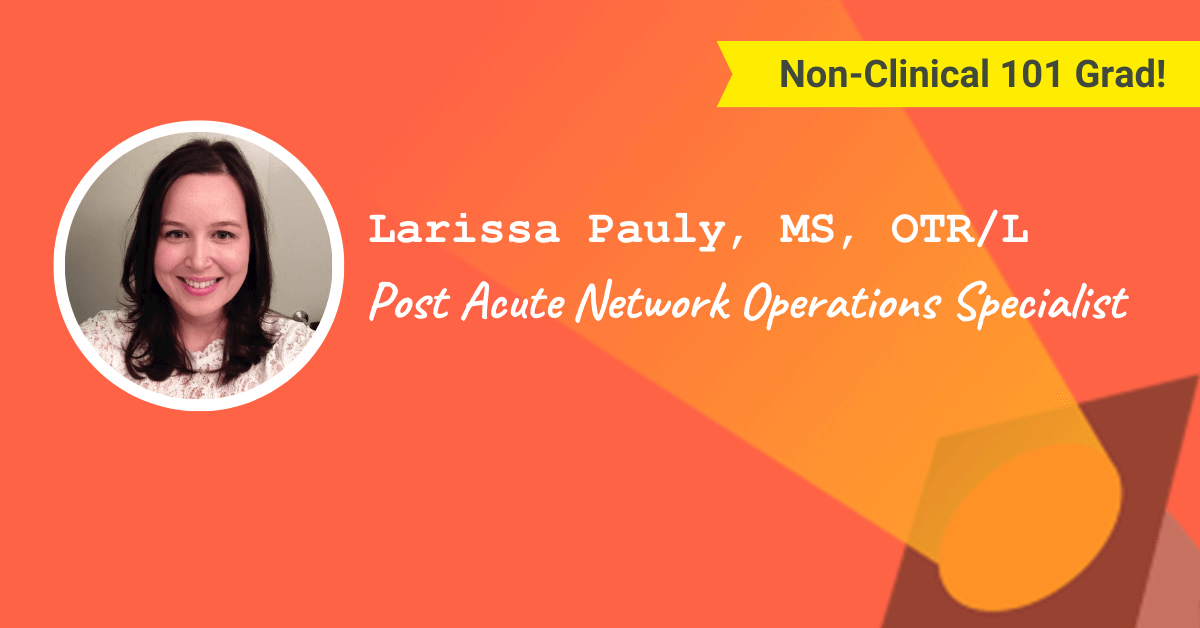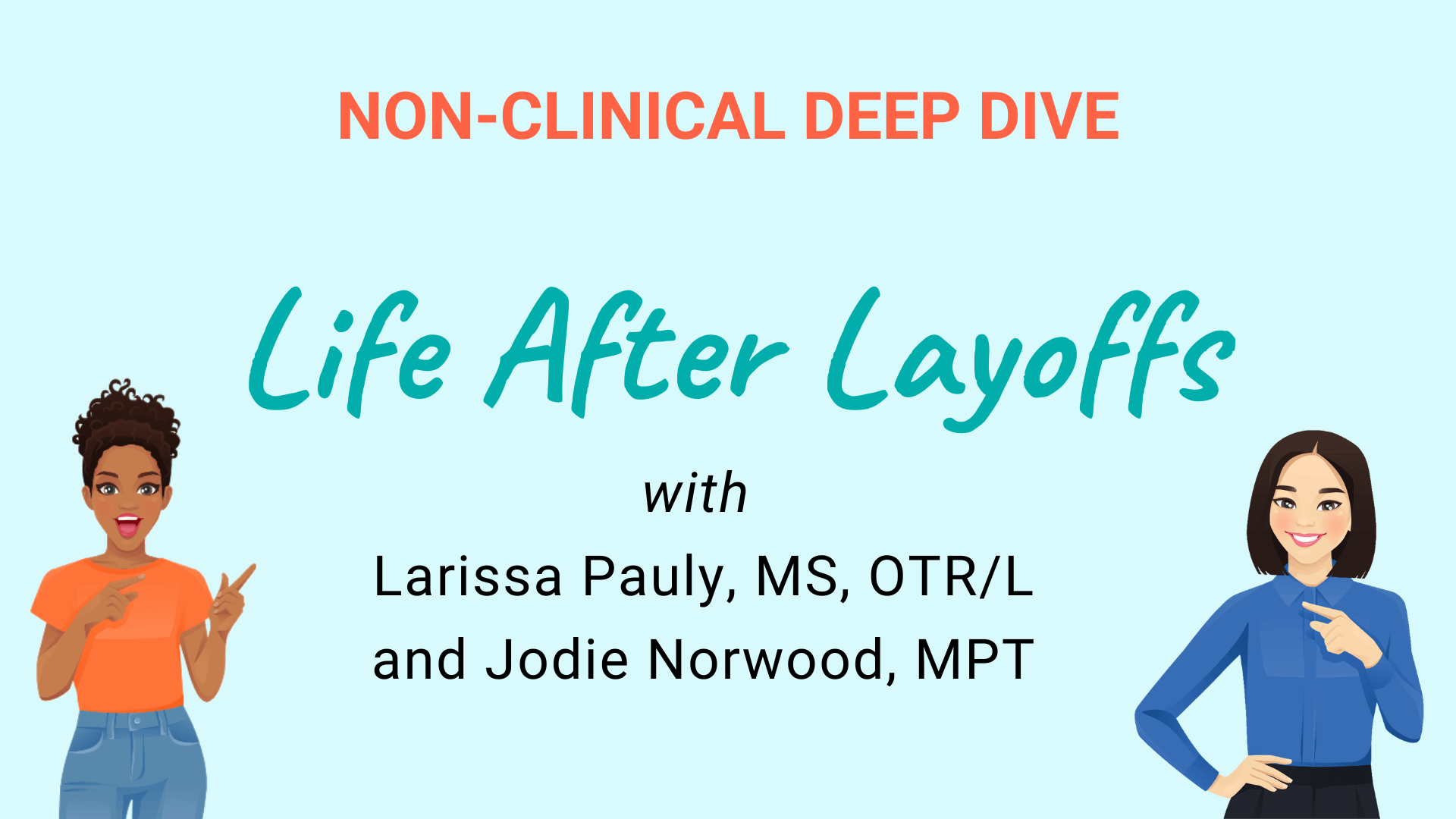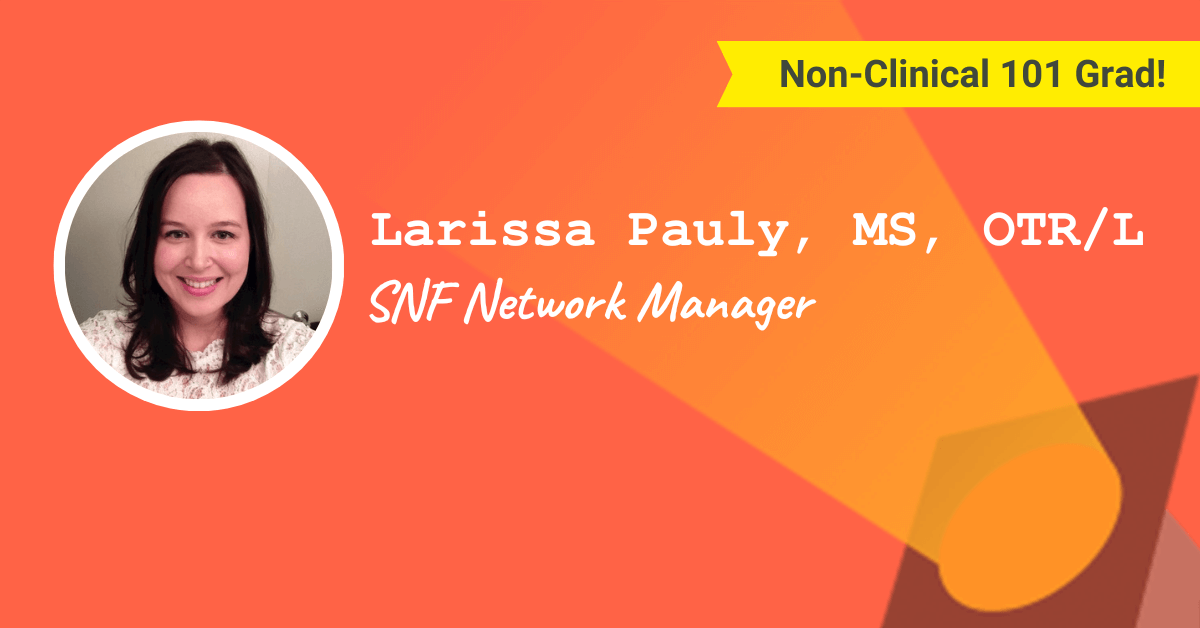This week’s spotlight is on Larissa Pauly, MS, OTR/L, a Non-Clinical 101 graduate who is now SNF Network Manager at Kaiser Permanente!
This post may contain affiliate links or codes. This won’t increase your cost, but it helps keep TNCPT alive, and free of annoying ads! Thank you for your support. 🙂
What is your full name, title, and company name for your current, primary role?
Larissa Pauly, MS, OTR/L — SNF Network Manager at Kaiser Permanente.

What additional roles do you currently have?
None! After balancing multiple jobs for many years, I am happy to say this my only one.
Where are you located?
Annapolis, MD.
Please refrain from contacting our spotlight participants on social media. There are thousands of readers just like you out there. 🙂 Please ask your questions in the comments on this blog post.
If you’re a Non-Clinical 101 student, you can network with many of our spotlight participants in the alumni groups!
Where did you go to OT school, and what year did you graduate?
Ithaca College, 2011. I did the combined BS/MS program.
What did you do when you first finished school, and for how long?
A lot of this was highlighted in my previous spotlight.
I worked at Anne Arundel Medical Center in Annapolis, MD, doing a combination of acute care OT and outpatient hand therapy. I was promoted to Staff 3 Occupational Therapist and served as the primary orthopedic and spine OT. I was there until 2019 when we moved to Raleigh, NC.
In 2020, we relocated to just outside Philadelphia, PA to provide additional support to a family member who became ill. During that time, I worked numerous different PRN jobs, including early intervention, a non-clinical job with DME-CG (now called Periscope365), and at a therapist-run mobile outpatient/wellness/home health agency called Full Range Health Services. They were all very rewarding roles which helped me build a diverse skill set.
In what setting(s) did you work, and what types of patients did you treat?
I’ve worked in the following settings:
- Acute care
- Outpatient hand therapy
- Early intervention
- Mobile outpatient
- Home health
My passion is ortho, particularly spine and shoulder replacements. I also enjoy women’s health and working with breast cancer patients.
What did you enjoy about your early roles?
I enjoyed connecting with people and helping them recover. It was very rewarding to follow a patient and help them progress throughout their journey—from acute care into the home or clinic setting.
I also really enjoyed collaborating with my ortho docs and other members of the patient’s medical team.
What else have you done since then, prior to your current role?
In 2021, I landed my first full-time, non-clinical OT job as a post-acute operations specialist on a special teams project with Signify Health. This healthcare tech company leveraged a tech platform and acted as a Medicare convener for hospital systems and health plans, managing accountable care organizations (ACOs) and bundled payments for care improvement (BPCI) patients.

In my role, I helped create an out-of-network program to follow patients that weren’t in the hospital’s preferred network.
When and why did you decide to do something non-clinical?
I needed a change after my first daughter was born. I had given a lot of myself to progressing my career, and I felt the strong need to do something different. I didn’t want to start over at another hospital or clinic and work on re-climbing the ladder.
I really enjoy program development, and that’s where I wanted to shift my focus. Improving our nation’s healthcare is important to me, and I felt powerless to change the system at an individual-patient level.
I’ve gotten to a place where I can impact operations and program development to treat the healthcare system itself, in order to benefit as many people as possible.
What are you doing these days?
In summer of 2022, CVS purchased Signify Health. After we received the announcement of the acquisition, they informed us that CVS was not going to leverage an entire arm of Signify Health.
This division of the company was going to be closed, and I was laid off that winter as part of the closure. This experience ultimately led me to my current role at Kaiser Permanente (KP).
If you want to learn more about what it was like to endure a layoff, you can find a “non-clinical deep dive” bonus video I did with my friend and coworker, Jodie Norwood, in Non-Clinical 101. It’s called Life After Layoffs, and you can access it if you enroll in Non-Clinical 101.

In any case, when we were laid off, my coworkers and I banded together to help each other with resumes, interview skills, updating our LinkedIn profiles, and job searching for each other.
Jodie, whom I mentioned above, actually found the role I have now while were were searching for jobs online one afternoon. Kaiser was looking for a nurse or therapist to manage their post-acute network. There was a home health position and a skilled nursing facility (SNF) position.
Can you tell us a bit more about the SNF Network Manager role?
My role was brand new to the company, and I’ve really enjoyed shaping it over the past year. In short, I lead the mobilization and ongoing execution of Kaiser’s post-acute strategy for their SNF network in the Mid-Atlantic region. This is composed of approximately 65 network SNFs across the tristate region of Maryland, DC and NOVA.
I ensure that we have network adequacy, the appropriate programs, and the specialty beds for our patients going to a SNF. This includes hemodialysis beds, vent beds, and programs such as amputee, stroke, ortho, etc.
We have three different tiers to our network: core, preferred, and contracted.
- Our high-volume CORE facilities have a KP physician on site. They collaborate with the different teams to work on various projects, including operational performance, readmission reduction, and program development.
- Preferred facilities are often sister facilities of our CORES. They carry a high volume of patients; however, they utilize their own physicians to care for the patients.
- Contract facilities are lower-volume facilities. They don’t always have one of our patients in the facility, but they are an important part of the network. They may have a specialty program—or are needed to achieve network adequacy—and have a local building available to all our patients.
I work with our CORE hospitals and discharge planners, connecting liaisons and SNF leadership to the case managers in charge of discharge planning to SNF.
My main goal is to ensure that the patient has access to high-quality SNFs close to home, where their family can support them.
Kaiser is unique in that it is both the payer and the provider. It functions like an ACO performance network, so my role is a combination of operations, project management, case management, performance improvement, and program development.
Are you still treating patients, or are you solely non-clinical?
I am solely non-clinical now. I have kept my license current. After having my second daughter, I did not have time to continue treating patients PRN.
How long have you been in your current role?
I was laid off in December 2022 and transitioned to KP at that time. Due to the longer lead time under the federal WARN Act, I was able to align my start and end dates well, so there was no impact on my family. I was seven months pregnant at the time of my layoff, and it was really important to me to have my health insurance timed correctly.
What do you wish you would’ve known before going into this role?
During my layoff, Signify paid for a Udemy subscription until our date of separation. I was going through my Six Sigma Green Belt course at the time. Unfortunately, I lost access before I was able to finish the course. I wish I had been able to complete it—and I still plan to—because I think the concepts are very beneficial to the broad cross-collaborative work I do now.
Did you get any special certifications or training along the way to help you get into your current role?
My original hospital job was very Lean/Six Sigma focused, so that performance improvement component and my program development skills were very beneficial when transitioning out.
I also signed up for Non-Clinical 101 to enhance my resume skills, interview skills, and learn what worked for others that I could then leverage for my own transition.
How did you find your job? Did you apply or find it through a connection?
My friend Jodie first saw the position online. Several other coworkers urged me to apply for the job because it seemed like a good fit.
Did you do anything special to your resume and cover letter to land the job?
I had access to an outplacement services support during the layoff. They reviewed my resume for readability and gave me pointers on my LinkedIn profile and interview skills. On my resume, I highlighted my cross-collaborative projects, relationship-building with external partners, and programs I worked on that assisted with patient safety and discharge planning. KP did not have me submit a cover letter.
What was the interview like for the SNF Network Manager role?
The interview process was about a month long, from when I submitted my resume and spoke to a recruiter to when I signed my offer letter. There were several weeks of downtime between my initial phone screen and when I had an interview with the hiring manager.
Once I completed the 1:1 interview, I was scheduled for my panel interview that same week and received a verbal offer the next day.
When completing interviews, I always try to market myself as a brand of one and convey what unique value add I would bring to the role. In this case, it was my experience working as a therapist in a multitude of settings, as well as my experience in engaging SNFs on an ACO and bundle level.
What are some of the things you did to stand out, take initiative, and advance in your career?
While this wasn’t an advancement within one company, it was definitely a career progression. I now get the opportunity to drive and define the position’s roles and responsibilities. As it stands right now, I currently don’t have any direct reports, but I sit in a leadership position supporting senior leadership and executives.
In terms of advancing your career, I would say there are a few big things you can do:
Verbalize to your manager that you’re interested in career growth. I’ve had managers reach out to me with unique experiences that helped build and strengthen my resume and skill set outside of my traditional role’s scope of responsibilities because I verbalized that I was interested in progressing my career.
Always market yourself as a brand of one. You need to be able to verbalize your impact on a company in a way executives and senior leadership understand—what’s your ROI. The company has invested in me with my salary and training. So, in turn, what have I done to make the company money? An example would be: align operational work streams to maximize efficiencies or minimize loss drivers.
I’ve also learned that when you’re meeting with senior leadership, you should lead with the problems you’ve addressed and solved. You need to be able to summarize your actions and scope of impact succinctly.
How have people reacted to you leaving patient care?
Several years ago, when I first verbalized me desire to be non-clinical, I received a decent amount of pushback. People would say, “Well, if you leave, it’s going to be hard for you to come back clinically.”
It has been drastically different the past few years. Now, I frequently have people reach out to me asking how I made my transition and how I got to where I am today.
The biggest piece of advice I give them is that, many times, career changes aren’t one big pivot. It’s a lot of little steps along the way. I took jobs that might not have been ideal or my dream jobs, but everything built my skill set to lead me to where I am today.
The other piece of advice I give is that, once you arrive at a non-clinical job, it’s okay to not have that role be your entire career.
Growth and progression happen. Layoffs happen. Interests shift as you’re exposed to new experiences. Your identity isn’t solely your job, and it’s always okay to try something new.
What’s a typical day or week in the life like for you? What types of tasks and responsibilities fill your time?
I have a lot of control over my schedule. I have more of a typical week, rather than a typical day, because my job is less task based than before.
The beginning of my week is usually when my recurring meetings happen. I have 1:1s, joint operating meetings, strategy meetings, and routine syncs with external partners.
Midweek, I’m in project mode and usually cross collaborating with different partners or departments. I also set aside one day for rounds with other members of the leadership and executive teams. This is where I’m visiting a SNF or a hospital to discuss operational flow processes.
By the end of the week, I’m usually wrapping up any deliverables asked of me, working on long-term projects, or attending team meetings. There are also times where I am on site, visiting potential new buildings to add to the network and taking tours of our building that may have a new program or gone under renovations.
What are some of the rewards of your role? What are the biggest challenges?
I really enjoy when I can make a process easier for our external providers. It is rewarding to provide a service or create a process that makes caregivers’ lives easier, so they can focus on patient care.
On the flip side, one of the major challenges is working for a “payvider.” My role is primarily in operations. Sometimes, when I initially meet with people, there can be that pushback—because there is the payer side of the company and the utilization management (UM) component—before they understand my role and get to know me.
How did your clinical background prepare you for this role? Which skills transferred?
I am a very strong advocate for clinicians being in leadership roles—at the front lines, leading the way for change. We provide care for people, and we understand better than most the impact that governmental changes have on our patients and their families.
In my current role, I’m treating the system to have the maximal beneficial impact on the patients that my company serves.
I think that therapists’ personalities (and their therapeutic use of self) often mean we can talk to a wide variety of people and meet them where they’re at. This has been a very beneficial skill set to have in my current line of work.
Roughly speaking, how are the hours and pay compared to patient care?
One of the things I love most about my job is how flexible my hours can be. My success is measured by the quality and timeliness of my deliverables. If I need to block time to go to a doctor’s appointment, I can. If I’m awake with insomnia one night, I can put in a few hours and flex my time somewhere within my week.
As far as pay, I make more than therapists do, and with that, I am comfortable. I feel lucky to be able to afford two young children in daycare in a high cost of living area without going broke.
What type of person do you think would do well in your role?
You need to be someone who can juggle several tasks at once, constantly triage, and prioritize your to-do list. You also need to be able to put people at ease, connect with them, and build trust, so they can open up and talk to you. And yes, there is a little bit of the thick-skin aspect as well, given that my role is UM adjacent.
Do you work remotely or onsite?
I am a remote worker. However, there are times when I go into one of our offices for group projects or meetings. I am also out in the field visiting several of my buildings by choice.
I find that making a face-to-face connection is beneficial vs. being a name they’ve never met behind an email.
My company doesn’t require me to be in the field, and the frequency that I make site visits is up to me.
Does your organization hire PT, OT, or SLP professionals into non-clinical roles? If so, what type of roles?
Yes! My job description was open to an RN, OT, PT or SLP. I’m a post-acute network manager; however, therapists could pursue jobs in UM, educator roles, or transitions-of-care roles.
I would encourage anyone who wants to get into KP to apply to any role that interests them. Then, outline your unique value add to that role with your therapy background.
Did you read any books, take any courses, or do anything special overall to get you where you are today?
Personally, no, other than taking Non-Clinical 101. However, I think a Six Sigma Green Belt or project management certification would be of value to someone working in my role.
As funny as this may sound, there are some great HR managers on TikTok now who give amazing interview and job advice.
What is a typical career path for someone in your role?
My role is newly created. I don’t see a typical path into this role or as a progression from it. The sky is the limit based on your personal skill set and motivations.
What is next for you? What are your high-level career aspirations?
Honestly, I don’t know. In the past, things happened that were outside of my control (layoffs, restructuring, etc.) that have caused me to pivot in a way I wasn’t anticipating. Right now, I’m happy working with the two leadership levels immediately above me. They make me feel valued, so I don’t have any plans to change unless that does.
In terms of high-level career goals, I have always thought that it would be nice to work for CMS and be the therapist at the table where healthcare policy decisions are being made.
I have always put myself in a position to be open to opportunities, and that has benefited me greatly throughout my career.
What would you recommend to someone who is considering going into a role like yours? Do you have any special words of wisdom for the readers?
Be very open minded about your non-clinical transition. My pivot didn’t happen overnight. It was a lot of little baby steps along the way, rather than one major pivot into a full-time, flexible, high-paying, remote role.
Often, when reading through the discussion boards, I see that people are frustrated that they’ve gotten multiple non-clinical job rejections—when by comparison, it’s very easy to a find a new clinical job.
When I was making my pivot, I diversified my skill set, got involved in non-patient care responsibilities, and took several PRN opportunities to build my resume—even if it wasn’t my dream role.
I also believe we are not in the same job market that our parents and grandparents were in—where they worked for the same company for 30 years. Once you’ve obtained your first non-clinical role and gained additional skills, you can always pivot and change jobs as your interests evolve and your experience grows.
A career is a journey, not a destination.
What would you like to change most in your profession, and why? How would you propose doing so?
I love OT, and I love helping patients regain control of their lives and learn new skills.
I think, as a whole, therapists have become metrics for bigger companies to fine-tune and optimize in order to have an ROI for shareholders.
I think productivity stifles creativity and ultimately only allows patients to have basic, standard treatments.
How do we change that? I think getting more therapists into leadership roles will help.
What career advice would you give yourself that you wish you had during school?
Take the harder, more challenging courses and rotations. It will build your confidence as you transition from a student to a new grad.
What would you teach to today’s graduate students in your profession, if you had the opportunity?
I’ve been fortunate enough to give several lectures to OT students at my alma mater, Ithaca College. I always stress to them to read current research and take as many CEU classes as you can. We, as therapists, need to promote and easily speak to current trends for evidence-based practice, and we need to articulate our value in relation to that.
Do you have any special advice for others who want to follow in your footsteps?
Always be open to new and different opportunities, even if they come in ways you don’t expect.





